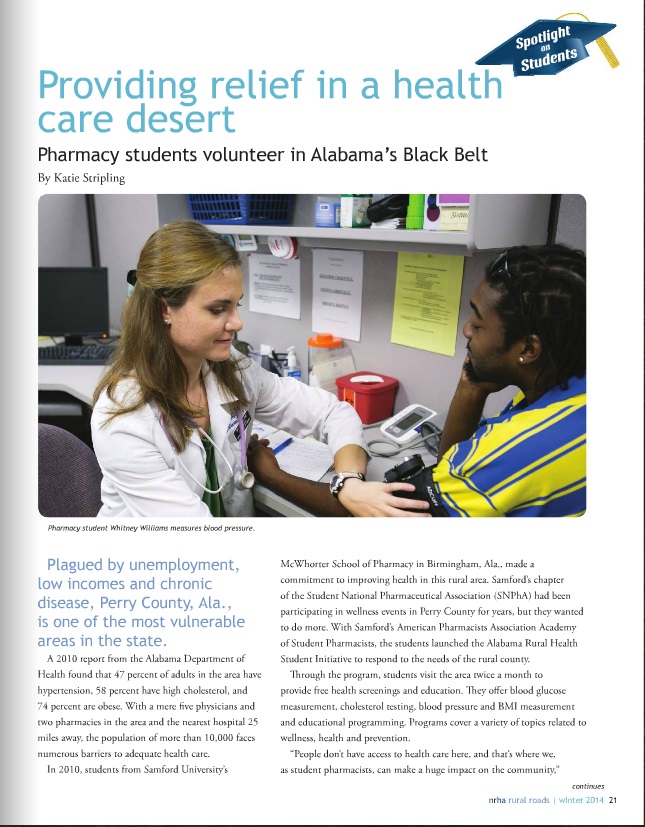
The National Rural Health Association featured the work of McWhorter School of Pharmacy students in Alabama's Black Belt in the Winter 2014 issue of Rural Roads. Full text and a link to the story are included below.
Providing Relief in a Health Care Desert, from Rural Roads
Plagued by unemployment, low incomes and chronic disease, Perry County, Alabama is one of the most vulnerable areas in the state. A 2010 report from the Alabama Department of Health found that 47 percent of adults in the area have hypertension, 58 percent have high cholesterol and 74 percent are obese. With a mere five physicians and two pharmacies in town, and the nearest hospital 25 miles away, the population of more than 10,000 faces numerous barriers to adequate health care.
In the summer of 2010, students from Samford University’s McWhorter School of Pharmacy in Birmingham, Ala. made a commitment to improving health in this rural area. The Samford chapter of the Student National Pharmaceutical Association (SNPhA) had been participating in wellness events in Perry County for years, but it was time to do more. Joining together with Samford’s American Pharmacists Association Academy of Student Pharmacists (APhA-ASP) the students launched the Alabama Rural Health Student Initiative to respond to the needs in Perry County. Through the program students visit the area twice a month to provide health screenings and education. Students provide blood glucose measurement, cholesterol testing, blood pressure and BMI measurement and educational programming. Programs cover a variety of topics related to wellness, health and prevention.
“People don’t have access to health care here and that’s where we, as student pharmacists, can make a huge impact on the community,” said Gwen Nance, fourth year pharmacy student and program manager. “Pharmacy is so much more than what you see at your local store. We go into the community and provide services for patients that make a huge impact in their lives.”
For some, the contact with the Samford students is the only access they have to health care. With 33 percent of the population living below the poverty level and a median household income of $32,800, many individuals find themselves in situations that prevent travel or access to other health care providers. Samford’s screenings are conveniently conducted at the local Friendship Baptist Church and the East Perry Volunteer Fire Department.
According to Perry County resident and member of Friendship Baptist Church, Nakia Moore, the screenings are making an impact. “I truly believe that these screenings have saved lives,” said Moore. “We have had many success stories that have come from these clinics.”
A key component of the program’s success is the ability to support patients after the screenings. Each month’s results are recorded to help the patients see their progress, or lack thereof. The longitudinal monitoring allows for patients in need to be referred either directly to their health care provider or to the pharmacist-run clinic affiliated with the Perry County Health Department and nonprofit organization Sowing Seeds of Hope. As an investment in the health of the people, McWhorter School of Pharmacy provides a full-time faculty member, Dr. Pilar Murphy, to staff the local clinic, further solidifying the school’s relationship to the area.
According to Dr. Murphy, area residents look forward to the bi-monthly screenings because for many it is the first time something like this has been offered to them. “What’s really helped all patients involved is having pharmacists and student pharmacists actually talk to the patients about their disease states. Many of them know they have diabetes or hypertension, but they are really unaware of the lifestyle changes they could implement to help control the disease states better,” she said. In addition, patients are educated on the importance of compliance with their medications.
Dr. Maisha Kelly Freeman, pharmacy professor and co-advisor for SNPhA believes that the benefits of the Rural Health Student Initiative are multifaceted. The program has fostered relationships, increased access to care, enhanced education on health topics and supported self-efficacy. “Perry County is somewhat of a health care desert,” she said. “To be able to come down here and see the impact that our students are having on lives and to see the trust building between pharmacist and patient, is truly rewarding,” she added.
In addition to the benefits to the residents, the Rural Health Student Initiative provides an opportunity for students to practically apply the clinical skills and knowledge learned in the classroom. By linking the classroom to reality, student pharmacists not only gain invaluable clinical experience, but they also develop an increased awareness of ways they can personally be involved in and lead efforts to overcome barriers to care. McWhorter School of Pharmacy encourages students to seek opportunities to transform lives through pharmacy and students involved in the Rural Health Initiative have embraced the challenge.
“For me, pharmacy is about helping people and giving back to the community. The Perry County outreach program has provided me with a way to do that,” said Nance in summary.
Student and faculty participation in the initiative have increased throughout the life of the program. Each new year brings a new group of future pharmacists who are enthusiastic about improving the health of an often disregarded patient population. By embracing this opportunity to serve, they are contributing to the overall health and wellness of the area and helping build awareness of the pharmacist’s role in individual health.
In recognition of the significant impact of the Alabama Rural Health Student Initiative, the American Association of Colleges of Pharmacy awarded the McWhorter School of Pharmacy its prestigious Student Community Engaged Service Award at their annual meeting in July 2014.
Founded as Howard College in Perry County in 1841, Samford took root in the heart of Alabama’s black belt, so named for its dark, fertile soil. Although the university left the area for Birmingham in 1880, Samford continues to care for the people of its hometown today.
To learn more about McWhorter School of Pharmacy, visit www.samford.edu/pharmacy.
